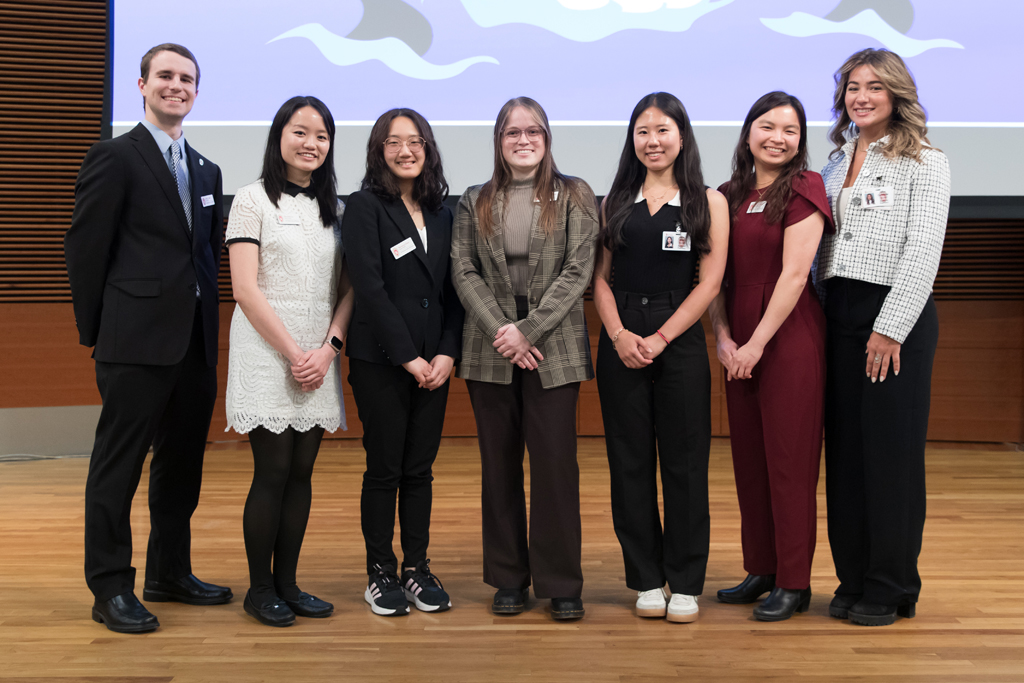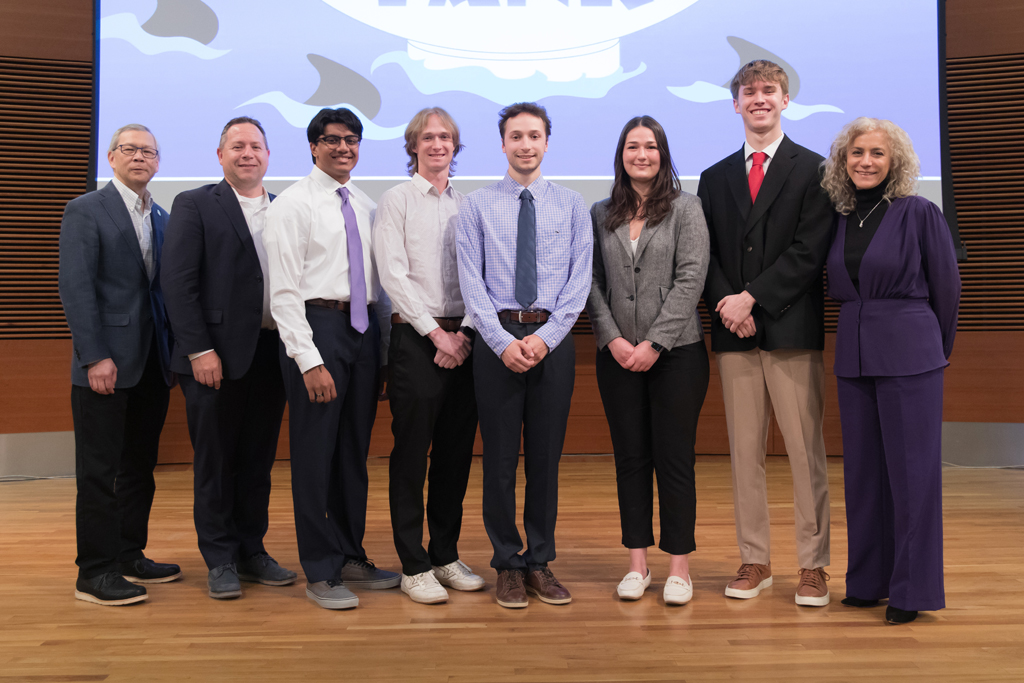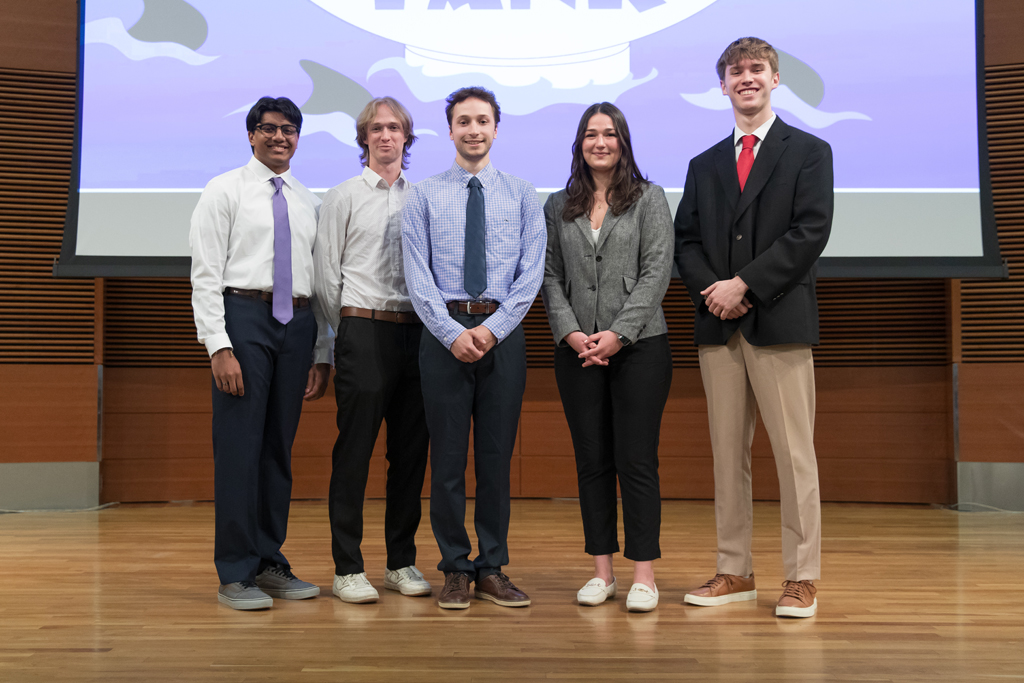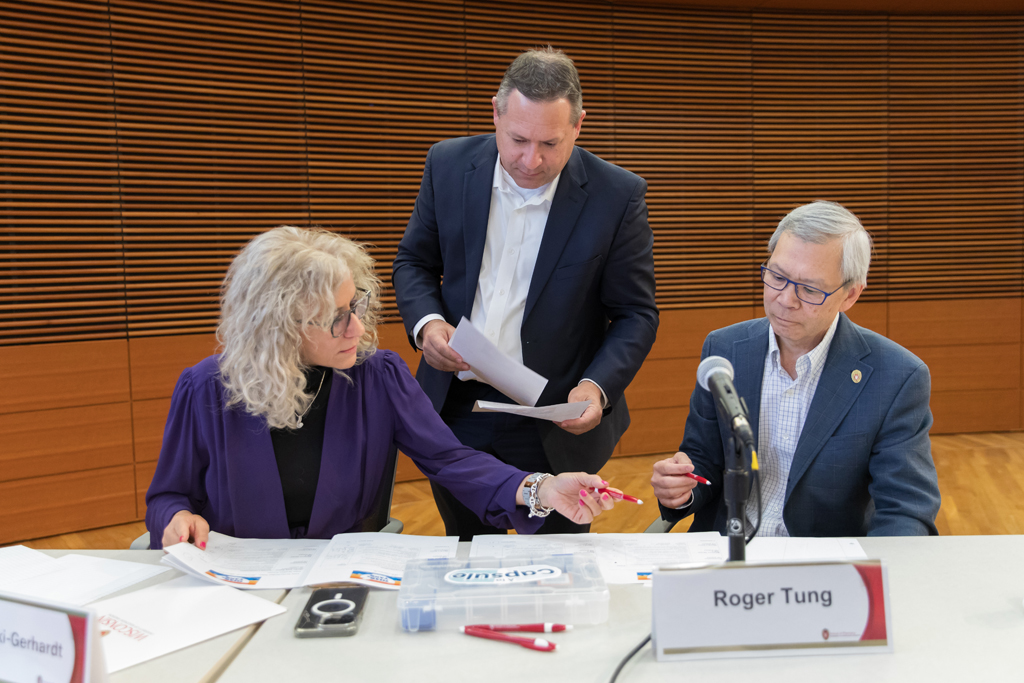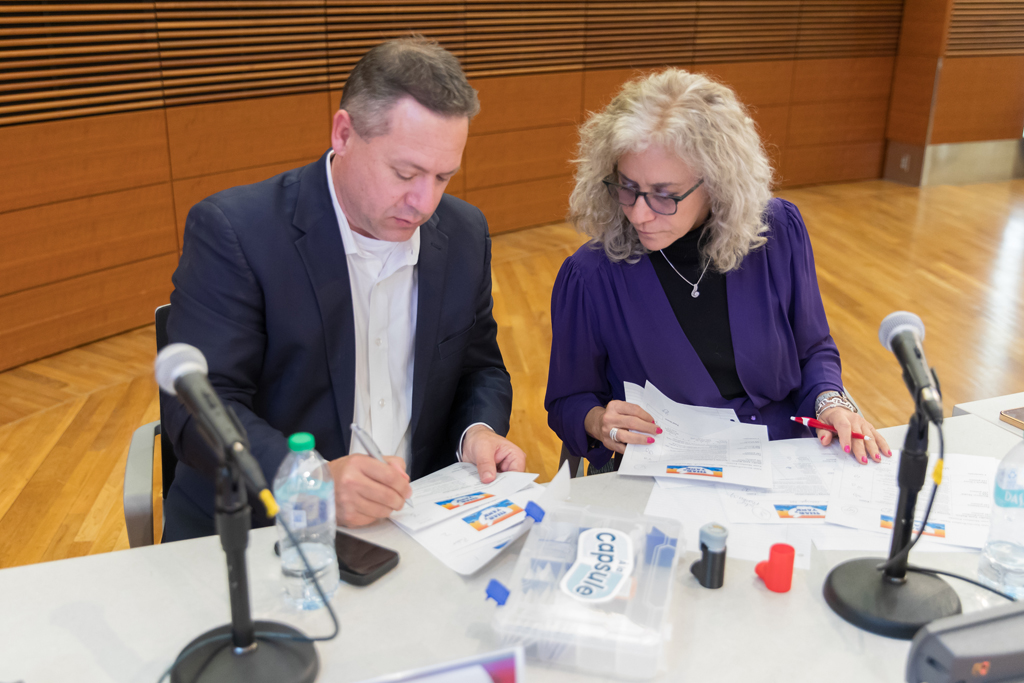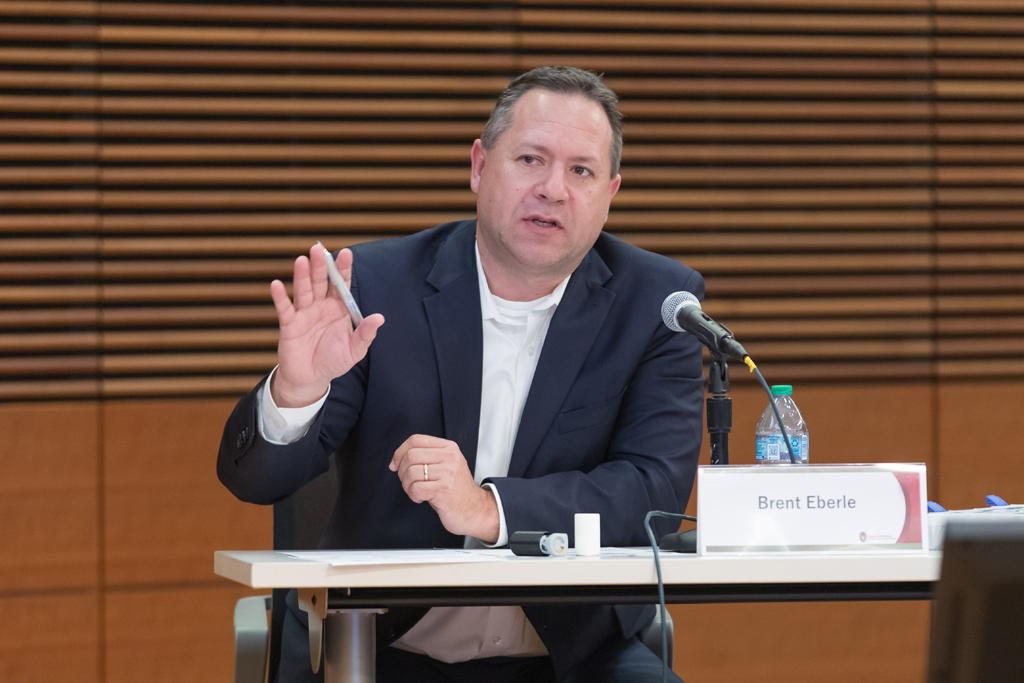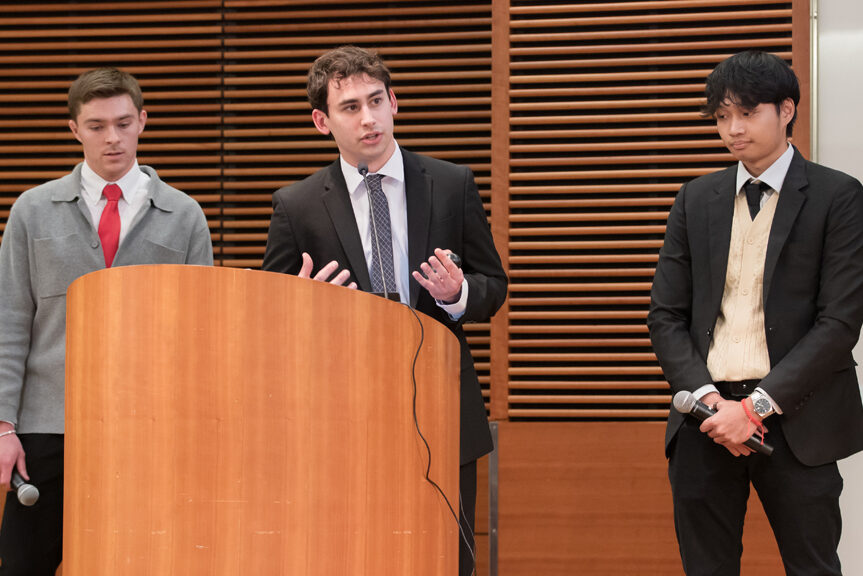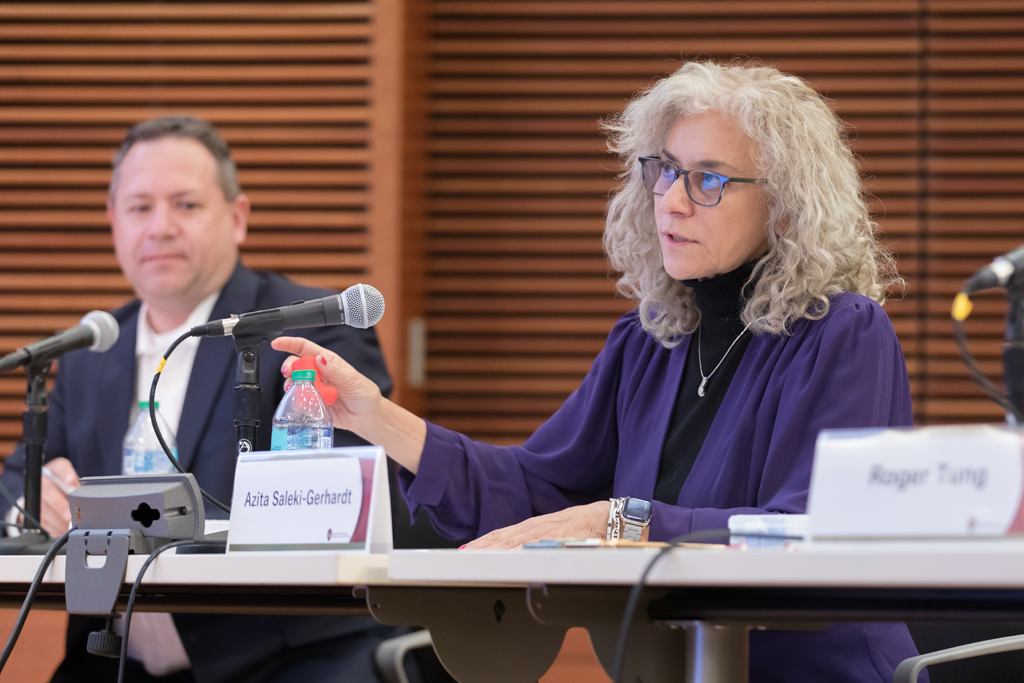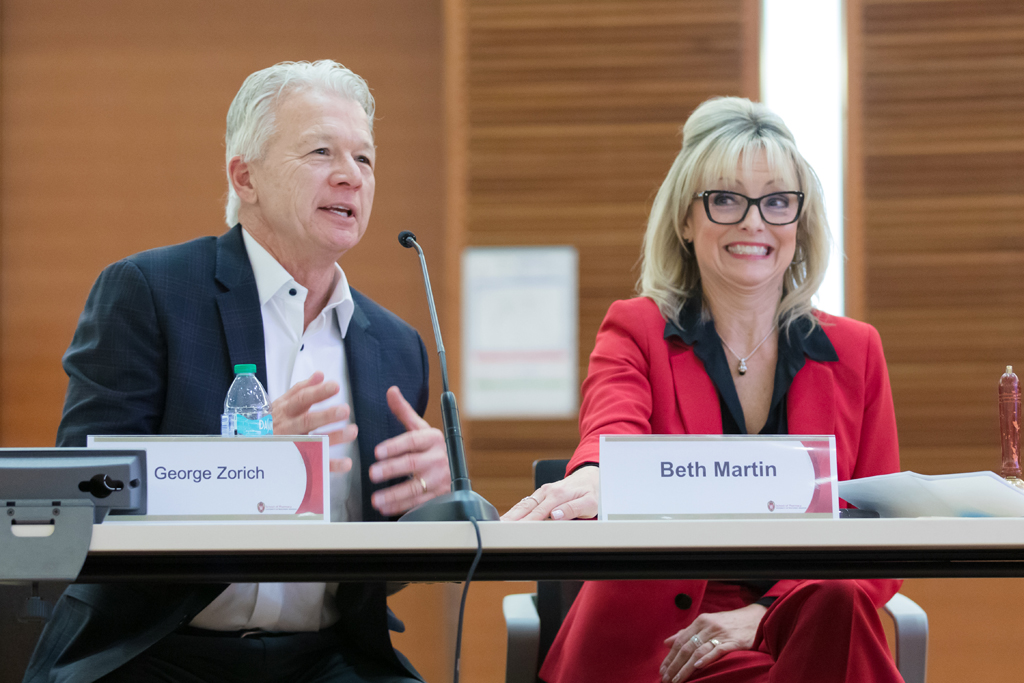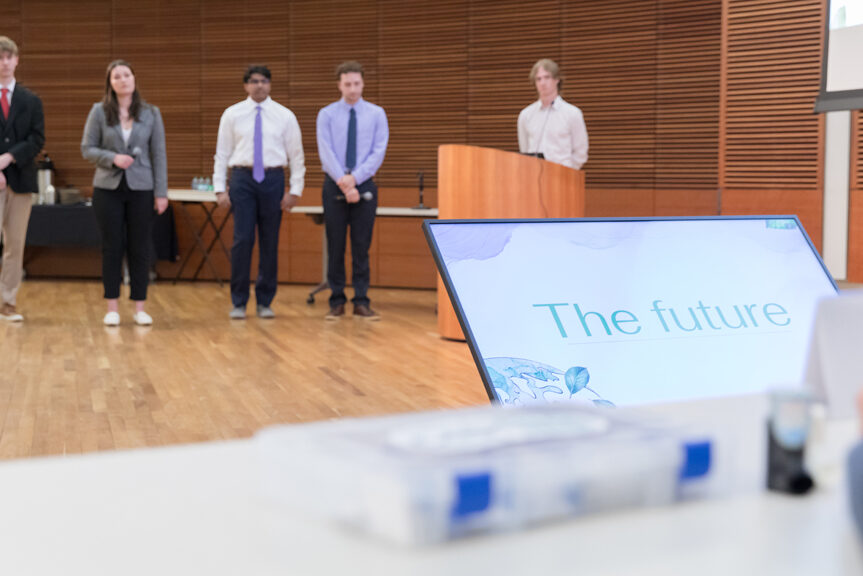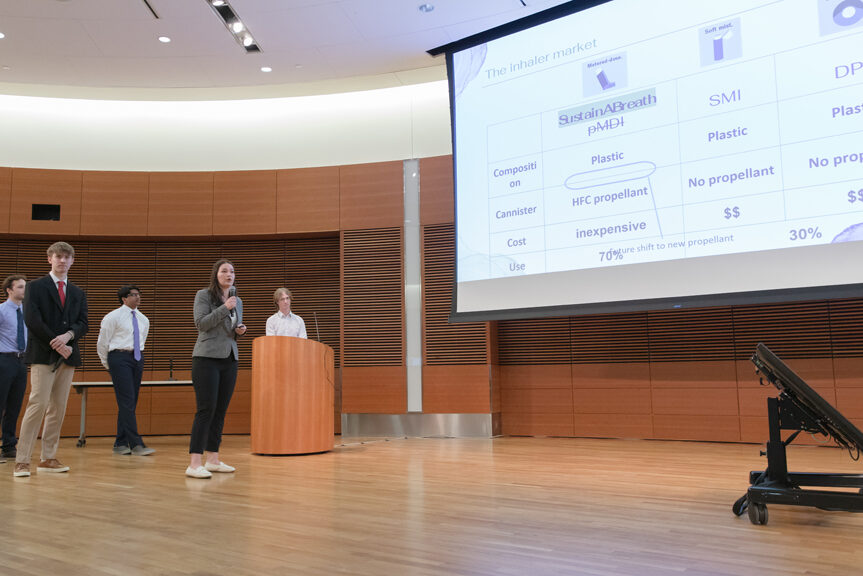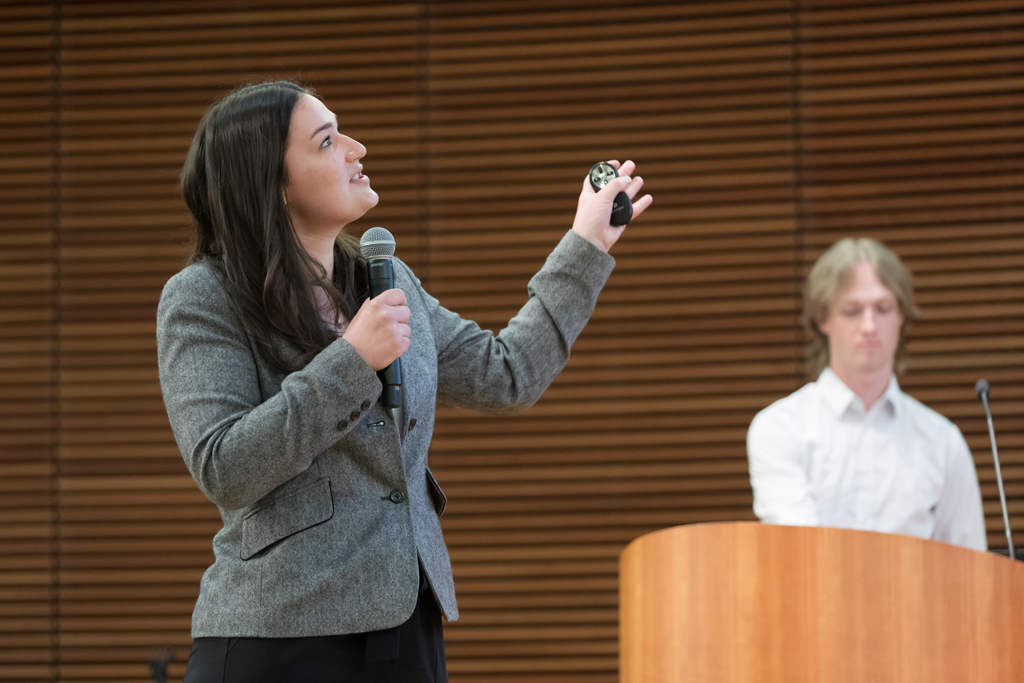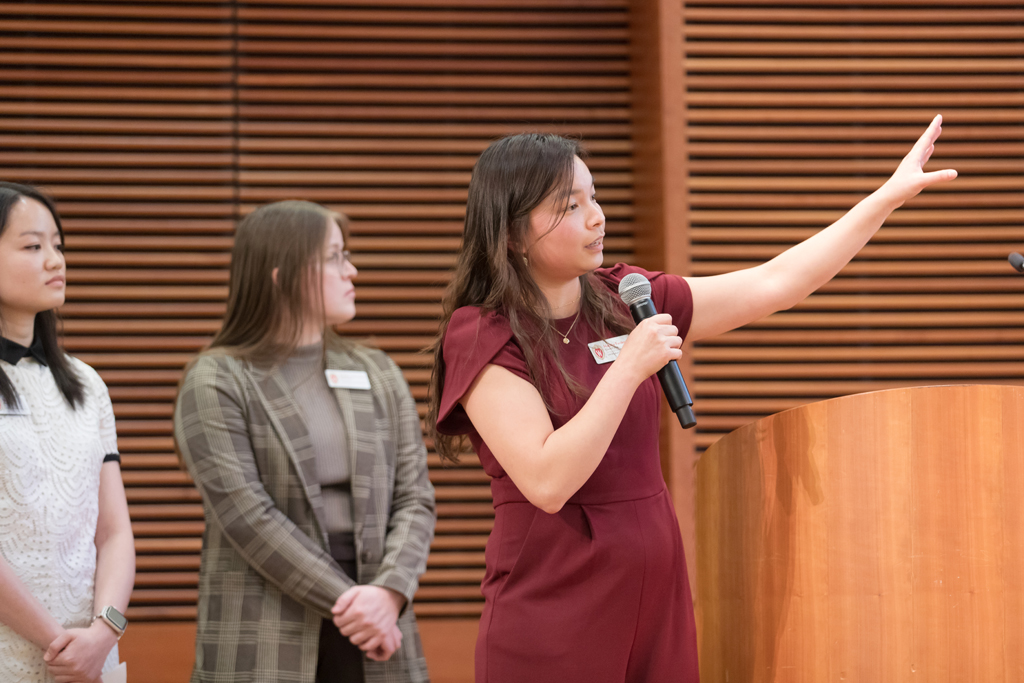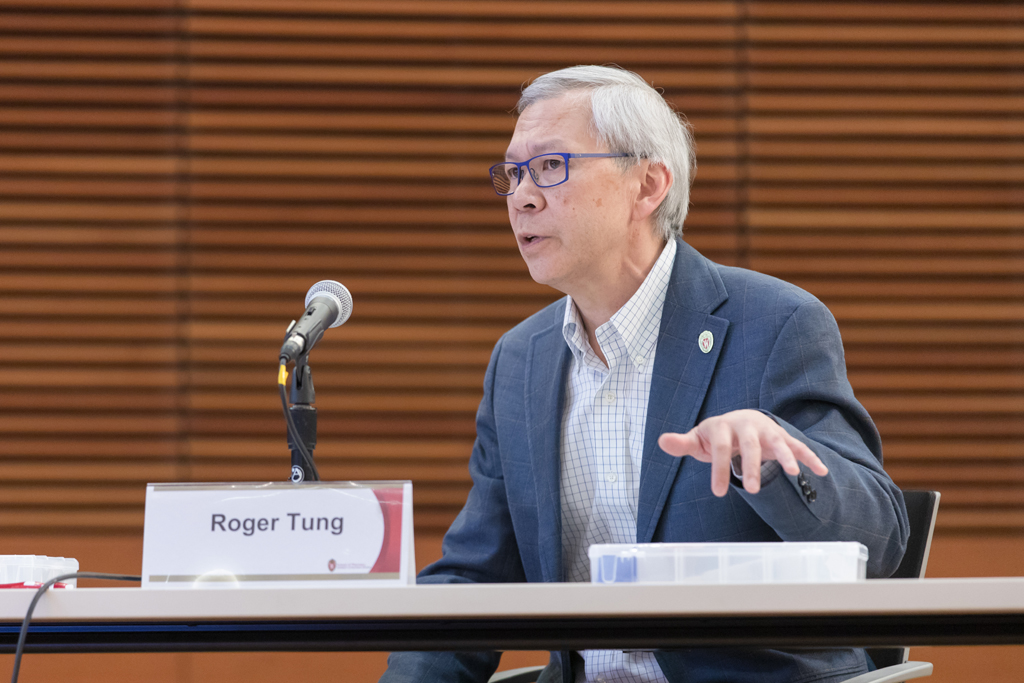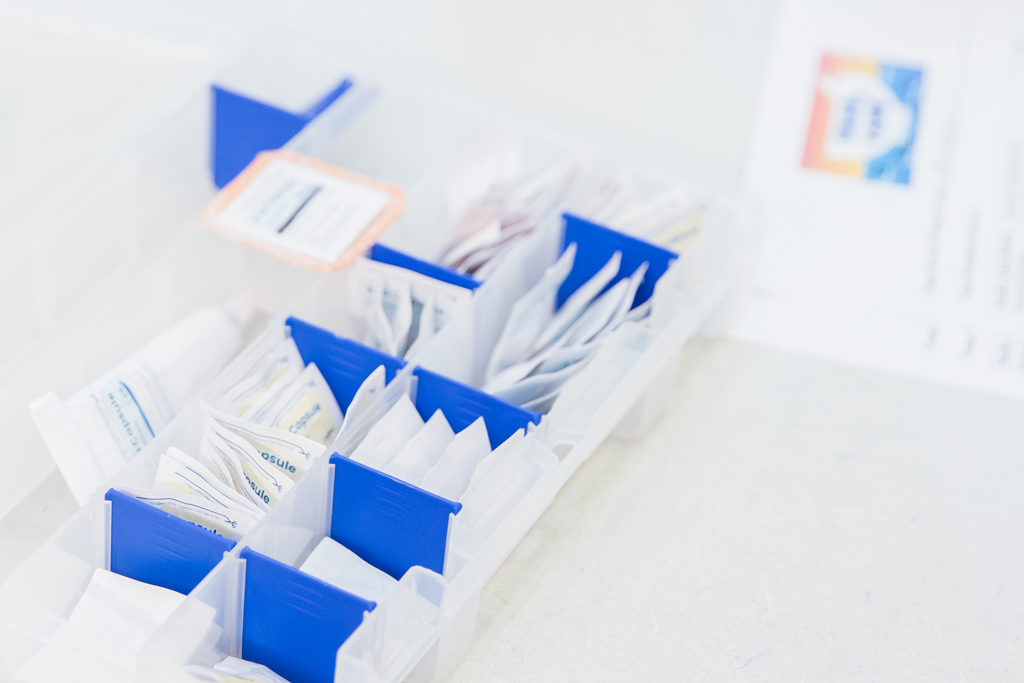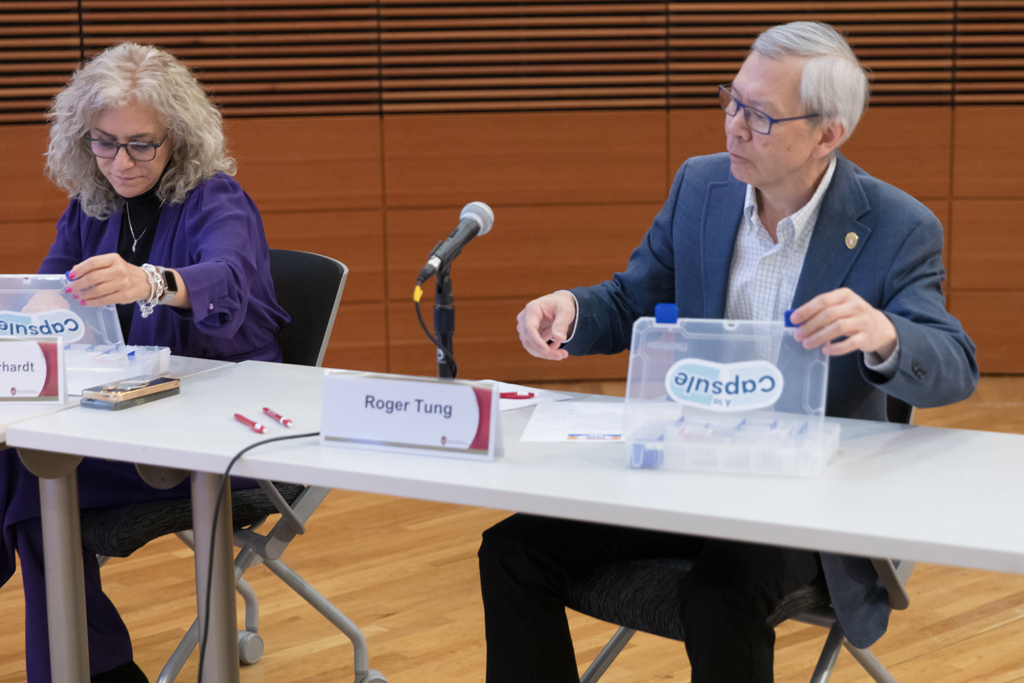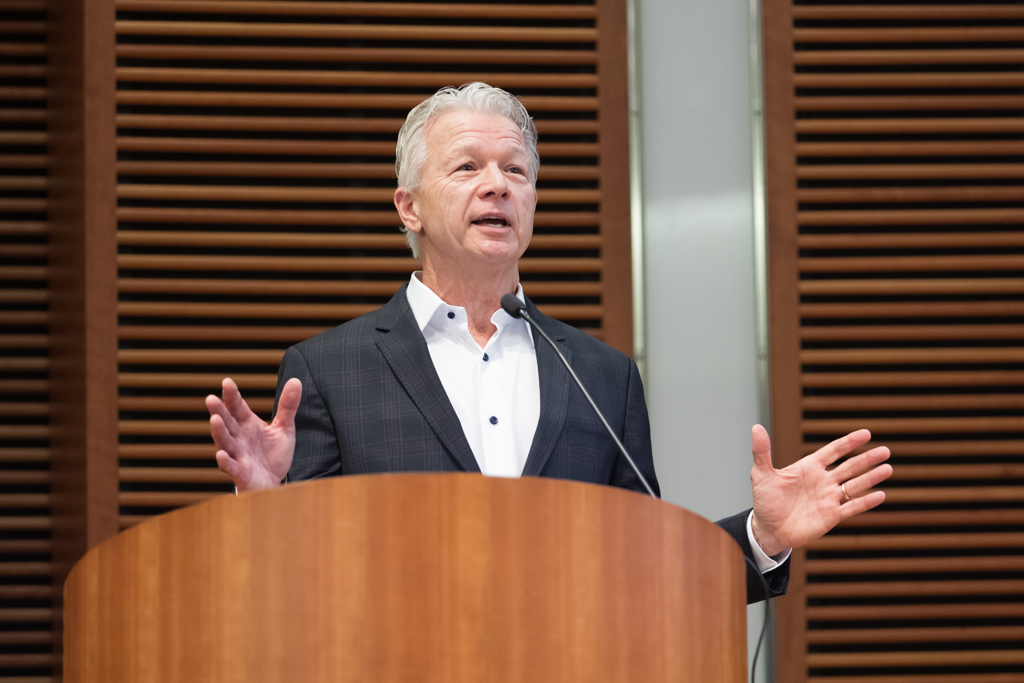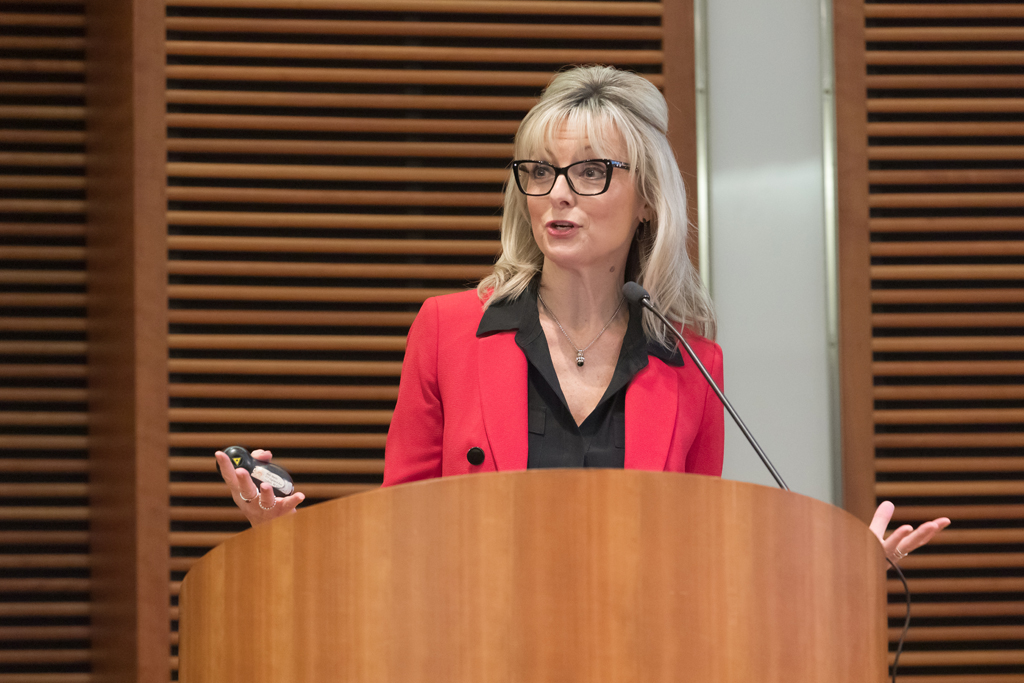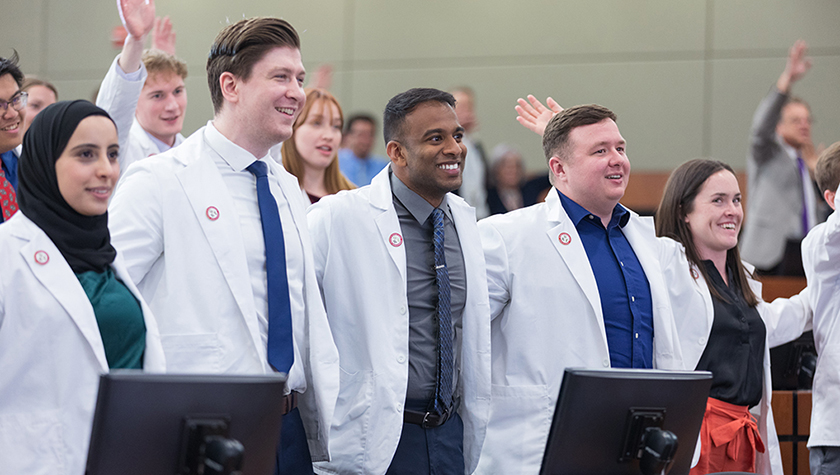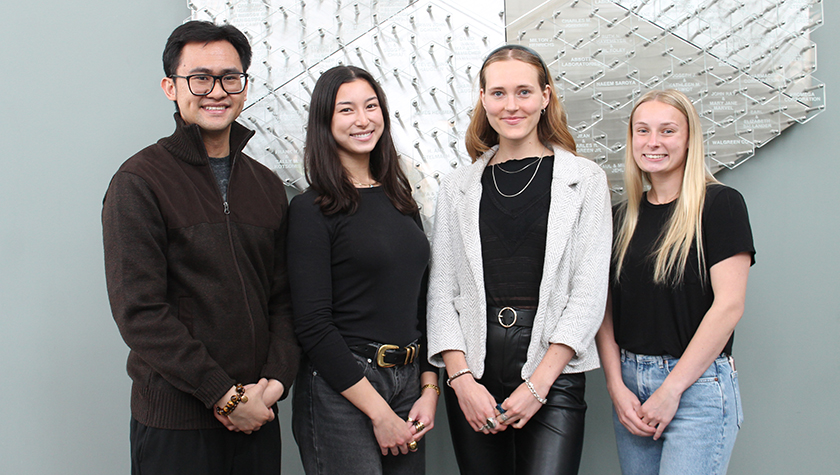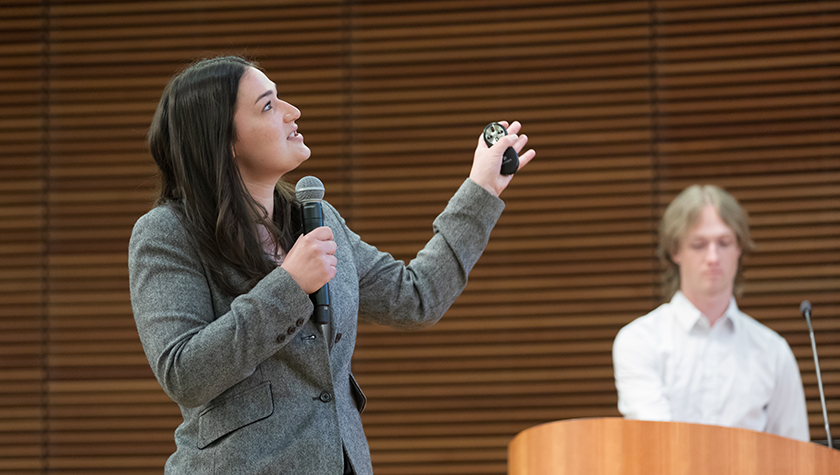
At the annual SHARx Tank event, PharmD students bring innovation, collaboration, and entrepreneurial spirit to solve healthcare issues
By Logan Underwood
About 200 million inhalers are dispensed per year, in the U.S. alone — enough to fill about 300 school buses.
“The majority of inhalers end up in a landfill because they’re either recycled inappropriately or they’re just thrown away in household trash,” says Jenna Vande Hey, now a third-year PharmD student at the University of Wisconsin–Madison School of Pharmacy.
But Vande Hey and a team of UW–Madison biomedical engineering students have a solution: a biodegradable bioplastic alternative to the typical plastic sleeve that holds the pressurized medication canister.
“We’re targeting the plastic to cut back on the amount of plastic that’s ending up in landfills,” she says. The biodegradable alternative could reduce the amount of plastic waste by 26.2 tons per year.
“This year, every team excelled at identifying unmet needs and proposing thoughtful, innovative solutions.”
—Roger Tung
Equipped with working prototypes of their product — SustainABreath — the team was one of three student groups pitching their product ideas to a panel of pharmaceutical industry leaders during the School of Pharmacy’s annual SHARx Tank competition this spring.
“It’s an invaluable experience,” says Vande Hey. “There’s nothing that can replicate the SHARx Tank experience in the classroom.”
Cultivating innovation
SHARx Tank grew out of a unique entrepreneurial program launched in 2018 by School of Pharmacy alum George Zorich (BS ’78), CEO and chairman of Nevakar, and Professor Beth Martin (BS ’90, MS ’03, PhD ’06), chair of the School’s Pharmacy Practice and Translational Research Division and assistant dean for Teaching and Learning.
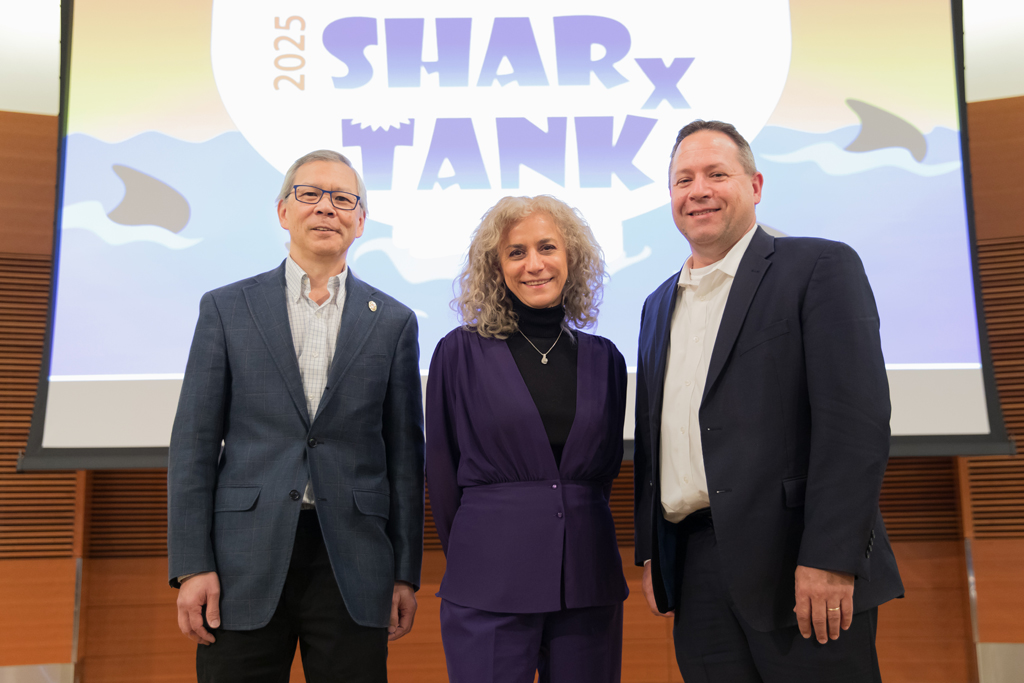
Through the program, PharmD students spend the academic year developing and refining a product or service idea — from concept to prototype — with feedback from mentors across campus and the healthcare industry. The entrepreneur club meets four to five times a semester.
“Every graduate will have experienced clinical pharmacy practice and treating patients,” says Zorich. “But what I want them to take away from SHARx Tank is a 50,000-foot view — the mindset of identifying healthcare problems and coming up with solutions.”
In recent years, Martin and Zorich expanded the program by collaborating with biomedical engineering students and partnering with Aimee Arnoldussen, innovation and commercialization specialist at the UW’s Discovery to Product. Arnoldussen helps students develop core entrepreneurial skills, including market research, funding, manufacturing, and pitch preparation.
“She’s an amazing campus partner,” says Martin. “She’ll tell students, ‘You need to talk to this person on my team,’ and make those connections. She’s the one who shows them how to create a pitch deck and what it needs to include.”
After more than a semester of work, student teams take the stage in the SHARx Tank to present their ideas to a panel of alumni judges: Azita Saleki-Gerhardt (BS ’88, MS ’91, PhD ’93), executive vice president and COO at AbbVie; Roger Tung (PhD ’87), founder of Concert Pharmaceuticals; and Brent Eberle (BS ’98), president of CivicaScript.
The winning team receives a $3,500 scholarship, with $1,500 going to the second-place team — all funded by Zorich. This year’s top honor went to SustainABreath and their eco-friendly inhaler sleeve innovation.
“Each year, I’ve noticed the pitches continue to evolve in a positive direction,” says Tung, who has served as a judge the past two years. “This year, every team excelled at identifying unmet needs and proposing thoughtful, innovative solutions.”
Eco-friendly breathing
The idea for SustainABreath began taking shape when Vande Hey was working at a community pharmacy and noticed how much plastic — including inhaler components — was routinely thrown away. Raised in an environmentally conscious family, she began to wonder why a more sustainable option didn’t exist.
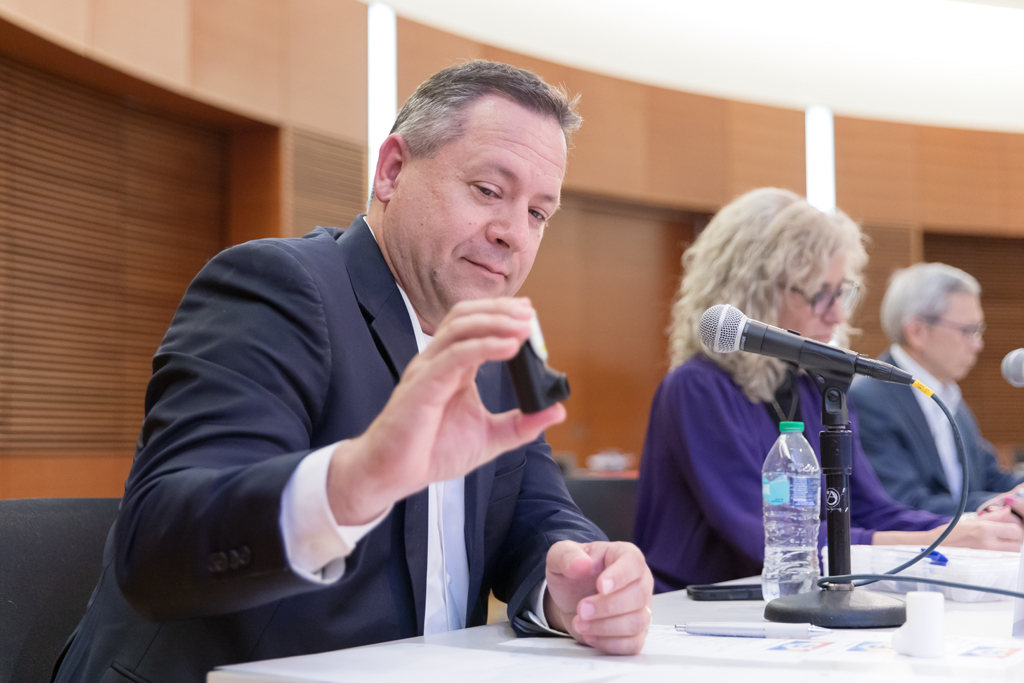
Out of the 200 million inhalers dispensed annually in the U.S., about 140 million are metered dose inhalers — the kind targeted by the SustainABreath team. Capturing just 1% of that market in their first year would mean producing 1.4 million inhaler sleeves, the team notes.
In fall 2024, then a second-year PharmD student, Vande Hey teamed up with UW–Madison biomedical engineering students Gannon Huebner, Jaden Badhwa, Sawyer Bussey, and James Briggs to bring the idea to life.
“We did more of a proof-of-concept to make sure that it was even plausible to 3D print with the material, and we were successful,” Vande Hey says. Now, they’re exploring production methods to support large-scale manufacturing.
“We’re currently in communications with a pharmaceutical company to see if there is any interest in collaboration,” she says. “We’ve been told that there is patent potential.”
That momentum caught the attention of SHARx Tank judge Roger Tung.
“They not only identified a specific, potentially patentable biodegradable plastic as a possible solution and created a prototype, but they also mapped out a realistic path to scaling their product profitably and engaged a potential pharmaceutical partner,” says Tung. “That level of initiative is exactly what it takes to build a successful company.”
An á la carte option
The second-place product also targets reducing waste. Created by third-year PharmD student John Lilek and first-year PharmD students Olive Cerniglia, Natalie Feider, Van Ahn Le, Katelynn Cleveland, Veronica Chen, and Julia Choi, AlaCapsule addresses two common healthcare problems: medication waste and patient access to accurate medication.
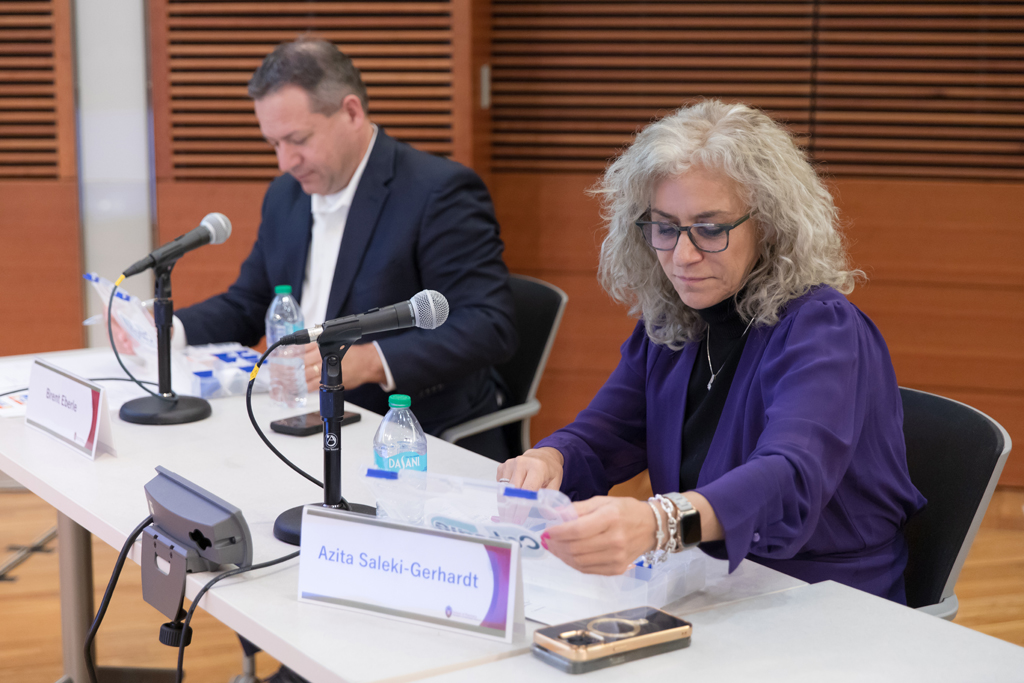
“We found that this is a real problem: You open up your drawers and there are tons of medications that you never use and that are expired,” says Choi. “To solve that problem, we decided to dispense a small quantity of medications that can be delivered to their house based on a subscription service.”
Feider first thought of providing a service in which patients could try out several possible medications in small quantities after a friend discovered a new allergy. Wanting to try several different allergy medications, they were deterred by the high quantities and costs of medications available.
Patients interested in AlaCapsule would log onto the website, input their symptoms, and then order unit-dosed pills from a variety of over-the-counter medication choices.
Choi and the team enjoyed being able to participate in the entrepreneurial side of the pharmacy world, receiving great feedback and reception from the judges at the final SHARx Tank event.
“This program is unique in that it offers valuable exposure to the business aspects of pharmacy while also providing opportunities to build meaningful connections with alumni pharmacists,” says Choi. “I believe the focus on interdisciplinary practice is especially important, as it encourages collaboration among healthcare professionals to ensure the most effective and comprehensive treatment for patients.”
Enhancing practice
Catalyst Rx, designed by third-year PharmD students Anthony Rende, Kaiser Van De Loo, and Ba Long Tang, seeks to bridge the gap between policy and practice for community pharmacies.
The consulting service would help independent community pharmacies unlock new clinical services, such as test-and-treat programs for strep and flu, by providing end-to-end support for implementing collaborative practice agreements. While some pharmacies have expanded on their own, many face legal, billing, or staffing barriers that prevent them from taking the first step.
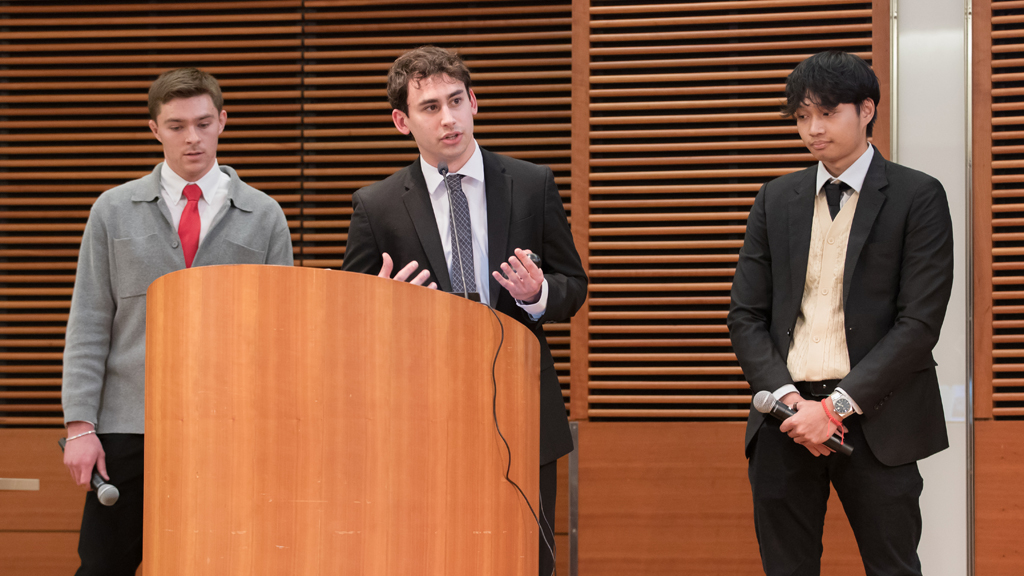
“Laws have changed within pharmacy, expanding the scope of practice, but many pharmacies haven’t caught up due to time, risk tolerance, and complexity,” says Rende. “We help them go from permission to performance.”
As Rende begins his fourth year in the School of Pharmacy, he is thankful for the skills and alumni connections he’s developed through SHARx Tank. Rende is hoping to draw from the SHARx Tank experience as he seeks a residency in leadership and administration.
“I think there’s so much value in getting more business acumen, understanding that there is so much more than what they could teach us in the classroom,” says Rende.
Tung, too, understands the value of the experience and the impact it can have on future careers, noting that entrepreneurship is a vital component of any society.
“From my experience on the School of Pharmacy Board of Visitors, I know the School is deeply committed to equipping students with the foundational skills needed for entrepreneurial success — analytical thinking, collaboration, communication, multitasking, leadership, and technical expertise,” he says. But those experiences are resource-intensive, which makes them difficult to create in higher education.
“SHARx is a rare and remarkable opportunity for students to bring their ideas to life and gain practical experience in entrepreneurship,” says Tung. “I’m truly glad that this event exists at the School of Pharmacy, and I’m grateful to be a part of it.”
